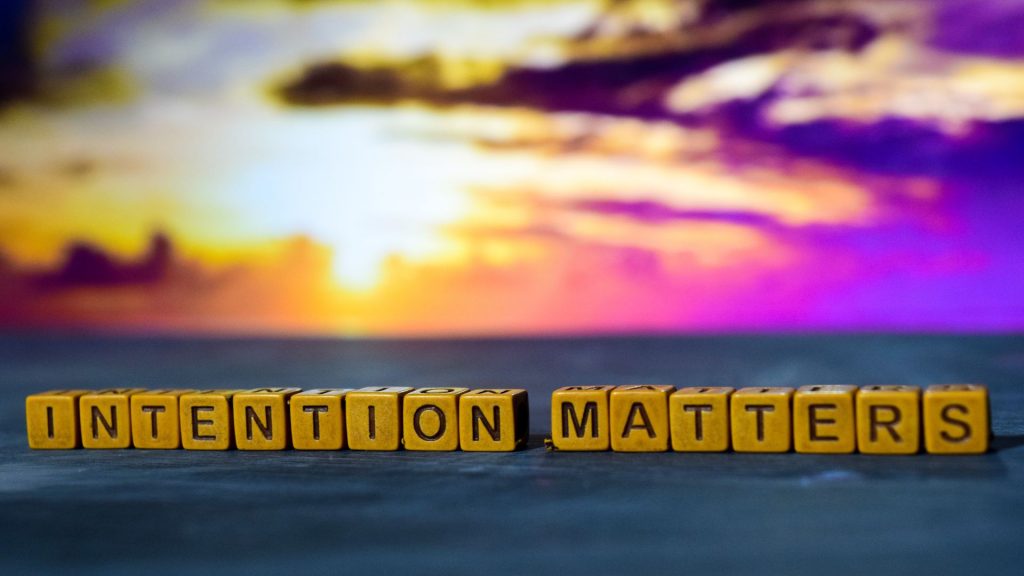Abdullah Ibn Al-Mubarak was seen standing before the Kaaba and was overheard saying,
“O Allah! Ibn Abu Al-Muwali told us on the authority of Muhammad Ibn Al-Munkadir, who reported Jabir (may Allah be pleased with him) as narrating that your Prophet (peace and lessings of Allah be upon him) said, ‘The water of Zamzam is for whatever it’s drunk for.’ I’m drinking it to prevent the thirst of the Day of Judgment.” Then Ibn Al-Mubarak drank it.
Life coaches everywhere know the power of good intentions, and Muslims everywhere should recognize the POWER of the RIGHT intentions.
What is important is that any actions we take should be directly related to the intent behind them.

But sometimes things happen, we get busy with our lives, and we don’t really reflect on our intentions enough.
Our actions, and even our deeds, become the “norm,” doing them becomes mindless, and reaping the benefits is not even in the picture.
Yet, when it comes to leading our best lives, to living with purpose and clarity, and to excellence in all that we do, the act of going back to our intentions and giving them their due importance becomes obligatory.
For the seeker of excellence, continually reviewing, expanding, and renewing your intention becomes as essential as oxygen is to your physical sustenance.
Meaningful Stories
Muna (not her real name) has had a tough year. She became a mother for the third time, and her mother passed away. Her husband works long hours in a city they just moved to.
She feels isolated, not knowing many people, and uprooted from her past life, her home, and her friends. She spends most of her time cooking, cleaning, and tending to her children.
She’s busy, yes, but in a “this is just filling my time” sort of way. Her actions are mechanical and her state of mind stolid (at best), and even her two-year-old sees it. One day, the child asked her mother why she never played with her.
Mustafa (not his real name) is trying to be the patient and understanding husband, but he says that everything he does to try to help Muna reclaim the essence of her lively life (the one before this year) is met with indifference from her.
Frankly, he thinks that he’s absorbing her impassiveness for himself. And this worries him.
The drive he had at his work, the rapport he enjoyed with his friends, and the excitement he first felt at the prospect of getting involved with the Muslim community in his area are all beginning to fade away. He wants to reverse the situation, but he doesn’t know where to begin.
Where he is to begin is where we should all begin at times, at the start of every morning, but especially more so when we’re trying to get out of a destructive rut or looking to accomplish a worthy goal: We should all begin with our intentions.
Purposefully intending to do something that will make your life lively is the place to start. That’s fine for him, argues Mustafa, but how can he “intend” to influence someone else’s life, namely, his wife?
The truth is, you can’t. But that’s part of making intentions, too.
By the very nature of the act, you are stating your objectives to Allah, Exalted be He, aiming to do the work necessary to achieve them, and then absolving yourself from the result, which may or may not be in your control.
The results are in the Hands of Allah, the Almighty, and there is liberty in knowing that so long as your intention is in the right place, you can’t go wrong.
Here are four tips to enable you to ensure you’re making the most of your intentions:
1- Speak them out loud and use meaningful adjectives
The act of verbalizing an intention is the first step in transforming it from some random “I should do this” type of thought that roams around the wasteland of our minds to an “I will do this” action plan.
What do you intend? Articulate it. Make it thrive with vibrancy. Have it be so colorful that you jump out of bed as the thought of it crosses your mind.
After much soul-searching, Mustafa found his voice. He expressed his intention to his wife one morning.
“Insha’ Allah, I’m making the intention to go for Hajj with you this year. We’ll have the most spiritual, wonderful time of our lives, and I can barely wait until I clear a path for you to kiss the black stone!”
This last part made Muna laugh out loud, catching her husband’s enthusiasm.
2- Give them a fighting chance to see daylight
What are the actions that will help you achieve your intentions?
What do you need to do so that your spoken intentions aren’t just a bunch of words that you speak nonchalantly because you think that you “should” be doing them?
Once you’ve determined what needs to be done, do it.
When Mustafa intended to work on bringing the “life” back into his marriage and into his entire life, he decided that a Hajj trip for him and Muna would be what they needed.
He started working on a plan, budgeting for the associated costs, and looking for someone to watch the children when they were away.
3- Visit them often
Connect with your intentions in your du’as to Allah, glorified be He. Ask Him to accept them and make them happen.
Reflect on them before doing an act and while thinking about doing an act. See them in your mind’s eye during times of reflection.
Allow them to present themselves when you least expect them to.
One time on his commute home, Mustafa was daydreaming so vividly about embarking on the Hajj rites with Muna that he nearly missed his stop.
4- Treat them tenderly with loving care
Knowing that they will serve you well, no matter if you attain them or not. Allah, Exalted be He, will look at your intentions not just accordingly but abundantly.
Narrated Abu Hurayrah (may Allah be pleased with him) that our Prophet (peace and blessings of Allah be upon him) said,
“Allah says, ‘If my slave intends to do a bad deed, then (O Angels) do not write it unless he does it; if he does it, then write it as it is. But if he refrains from doing it for My Sake, then write it as a good deed (in his account). (On the other hand,) if he intends to do a good deed but does not do it, then write it as a good deed (in his account), and if he does it, then write it for him (in his account) as ten good deeds up to seven-hundred times'” [Al-Bukhari].
In the end, it’s an interesting thing about intentions. You never really comprehend how far they’ll go or what a lasting impression and legacy they can result in.
Hajar (may Allah be pleased with her) had the intention to take care of her infant.
Left in a barren land, she walked repeatedly between the mounts of Al-Safa and Al-Marwa, looking for sustenance.
As she came down and saw the gushing water, she proclaimed, “Zimmi Zimmi“ (i.e., ‘Keep the water. Keep the water’), and cupped her hands to catch it. And it flowed and flowed.
Her son drank, and she drank. Ibn Al-Mubarak drank.
Generations of Muslims have drank from it and will continue to do so, insha’ Allah.
What will your intention be when you get the chance?
Mustafa knows what his will be.
***
From the archives.


